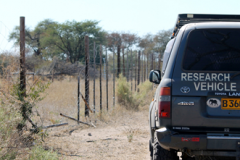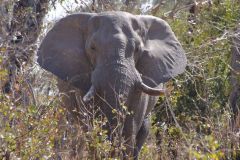(Loxodonta africana)
Elephants (Loxodonta africana) are an iconic feature of the Botswana landscape. They benefit greatly from conservation efforts touting their vulnerable status and in turn contribute significantly to the tourism industry. Yet elephants cause problems in Botswana (home to some 150,000 elephants) by eroding habitat, threatening biodiversity, destroying agricultural crops, and injuring humans. Needless to say, there are many perspectives on the pros and cons of elephants in the region.
Allison Mayberry joined our research team in September 2013. She has a B.Sc. in Biology and is interested in community issues related to wildlife conservation; she spent a year promoting ethical futures for captive Asian elephants in the Thai tourism industry. Allie's project focuses on human-elephant well-being in the Boteti Region of Botswana with fieldwork taking place from May through August 2014. She has disseminated information to key stakeholders through an infographic, as well as a publication in Conservation and Society (2017) and academic presentations in the USA and India.
Allie’s research was generously funded by an Ontario Graduate Scholarship and the Care-A-Thon Animal Welfare Research Scholarship from the Ontario Veterinary College, University of Guelph. The project was supported by a research permit from the Department of Wildlife and National Parks. We collaborated with Dr. Kate Evans' research team of behavioural ecologists working with elephants in Makgadikgadi Pans National Park via Elephants for Africa.




